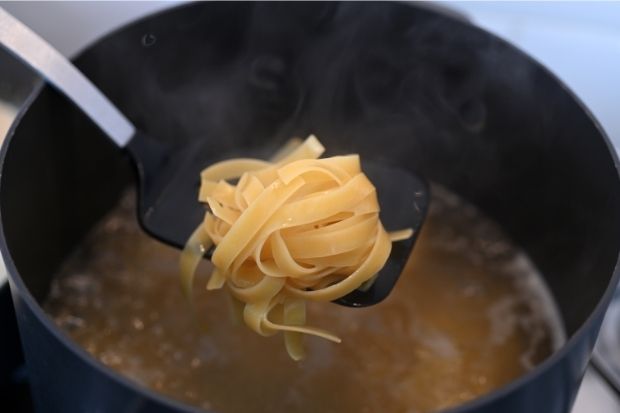When you’re cooking pasta, most recipes will be relatively simple, but that doesn’t mean certain complications can’t pop up every now and then. With fettuccine, as with other types of pasta, you sometimes have problems with the noodles sticking.
To make fettuccine noodles not stick together, add olive oil to the water (only if you’re not including sauce in your dish), add plenty of salt to the water, wait until the water is boiling before you add the pasta, and stir the pasta frequently as it cooks.
Below are some of the most important things to remember when you don’t want your fettuccine noodles to stick:
Only Add Pasta to Water That Is Boiling

There is a huge difference between boiling water and simmering water, and if your water is not boiling, your pasta can stick. Water that is only simmering will cause the pasta noodles to stick together and they’ll have a gummy texture. If you’re unsure, let the water boil some more. Once there are lots of bubbles and an almost violent type of shaking, you can drop in your pasta noodles.
Make Sure You Have Enough Water
Your pot should be big enough to hold the water you need, and you should use 3-4 quarts of water for every pound of pasta that you’re cooking. If you don’t use enough water, the noodles will touch each other and get sticky and gummy. Lots of water prevents that from happening, especially as the pasta gets close to the end of its cooking time.
Add Plenty of Salt
While salt is the only ingredient you should add to your pasta water, you should use lots of it. What’s usually recommended is 1.5 tablespoons of salt for every pound of pasta you’re cooking. The salt is there mostly for flavor, but it can also prevent some of your pasta noodles from sticking together. Don’t just sprinkle salt in your water. Take out your measuring spoon and make sure you put enough in there.
Add Olive Oil to the Water (Or Don’t)
Olive oil is believed to help pasta not stick together. Nevertheless, olive oil can also make the noodles too greasy and can make it harder for sauce to stick to the pasta. So if you’re not planning on making fettuccine pasta with sauce but instead prefer to eat your noodles with just some type of fat and a little salt, you can go ahead and add olive oil to the water.
Always Use the Right Portions

We’ve all heard that we should use a certain amount of pasta for every person who will be eating, but a lot of people ignore this rule. For smaller pasta, one heaping cup full per serving is about right, and for longer or larger pasta, there are measuring tools you can buy to make sure you use the right amount. It’s important to follow this rule because it regulates the amount of pasta that’s in the pot of water and reduces the chances of sticking issues.
Make Sure You Dust Fresh Noodles With Flour
Fresh noodles are different from store-bought noodles, and fresh noodles can release moisture as they sit. When using fresh noodles, dust them with a little flour before you cut them, and dust them with some more flour before you portion them out to place in the boiling water. The flour will keep the noodles dry so that they are less moist and more able to stay non-sticky.
Watch Your Timing When Cooking Your Noodles
You should time the cooking of your noodles with the cooking of your pasta sauce. If your noodles are done and your sauce isn’t, it’s much more likely that your cooked pasta will start to stick together while you’re waiting for the sauce to be done. Time the noodles to correspond to the cooking of your sauce, or keep your sauce on simmer until the noodles are done. The sauce should finish either first or at the same time as the noodles.
Stir Your Pasta a Lot
This is obvious, but the more you stir the pasta, the less likely it will start sticking during boiling. This doesn’t mean you have to stir constantly the entire time the pasta is cooking, but you also don’t want to walk away from the pasta and forget about it. Stir the pasta well as soon as you put it in the water, again about midway through cooking, and again toward the end. If you feel it sticking as you’re stirring, stir it for a long time until the noodles start to come apart.
Some people also find that placing cold water and not hot water in the pot in the beginning helps to reduce the chances that the pasta will stick, but the tips mentioned above have been proven to help.
